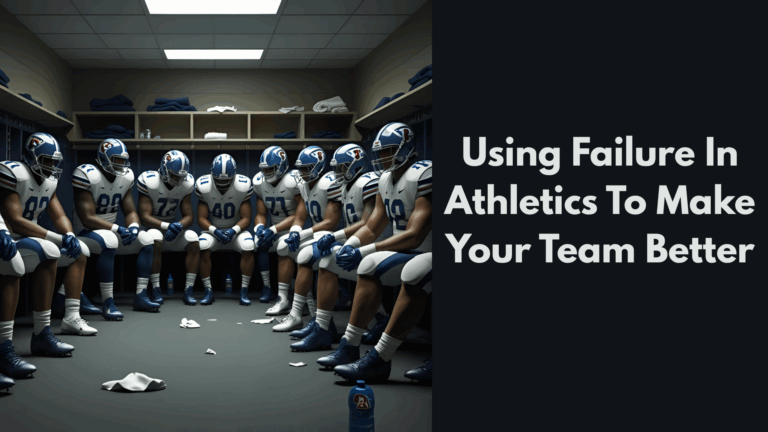
There is NO more comprehensive book that you can read and use to help you prepare to become a Head Coach than The Head Coach Blueprint (or on Amazon) that yours truly wrote! There is nothing like it on the job market, and if you’re serious about becoming a Head Coach, you need to make the small investment in this book. We cover everything that you need to know to prepare yourself along the way.

FAR too many coaches have jumped at the chance to become a Head Coach simply because it was offered, and NOT because it was the right thing to do. Don’t take my word for it!
“Be careful what you wish for.” – Pete Smolin, 21 years as a Head Coach, Beaumont, CA.
“Be ready to spend countless hours on issues outside of coaching football. I didn’t fully understand what that meant until I became a Head Coach.” – John Hayden, 20 years as a Head Coach, Clinton, IL
This article below is a piece from one of my chapters from The Head Coach Blueprint.
Unfortunately I have seen quite a few coaches make a wrong career move. They accepted a Head Coaching position because they really wanted to be a Head Coach. They jumped at the chance. But then, the rug gets pulled out from under them. Much like that high profile recruit who saw nothing but the “great things” during his recruiting visit, but then wondered where all that stuff was after he signed the letter of intent and started classes. The fanfare disappeared. The beautiful coeds taking him on a tour of the school were gone, in fact they shunned him when he ran into them on campus! All of a sudden he had to actually pay for his dinner! Have you been there as a Head Coach?
“We believe in having as many coaches on campus as possible, and will definitely help you get coaches on campus.” Then, there is an English opening that you saw posted in the teacher’s lounge. You go to the Athletic Director with a GREAT potential Assistant Coach. “Well Coach, they’re going to just have to apply, and we will see what happens but I can’t even promise you that they’ll get an interview.”
Wow, that changed quickly didn’t it?
Some coaches who I have worked with have been able to get out of the bind they put themselves in, and some of them were stuck in a career ending position. Most of these coaches failed to do their due diligence in accepting their position. They didn’t ask enough questions. For the next couple of chapters, we will look at this very important aspect of becoming a Head Coach: the mission, philosophy and practical support of the administration. I will give you the best advice that I can on how to avoid going to the wrong spot.
Trust me, there is nothing worse than moving your entire family to a new area for a job that is not a good fit for you at the end of the day! It is very important for YOU (employee) to interview THEM (employer) at some point during the process.
Here are some interview questions that YOU can ask THEM!
What are the qualifications that you (administration) have for the assistants that I want to bring with me, and or hire during my time as your Head Coach?
You will want to know what the school wants in their Assistant Coaches. Do they need to have a job on campus? Will they hire them if they have had an arrest in the last thirty six months? Are there some arrests that are “okay” and hireable still? What will prevent them from being hired? Do they care where their Assistant Coaches live? If it is a private school, do their children need to attend the school for them to coach there? These are all very important questions and philosophies to talk through so that you are on the same page with your new bosses. Few things are more important than being able to put together a dynamite staff.
What kind of technology is there currently within the athletic program? Video cameras, projector, editing software?
Many coaches rely on technology to help their programs. It might be video cameras or I Pads on the bench or subscriptions to the latest and greatest tech pieces for your program. Does the district support technology financially? Or is that all up to you to fundraise for? Is there infrastructure needed to support your vision? In football for instance, is there an endzone camera and sideline video system for you to use? If not, why not? Was it a matter of the resources not being in place, or the former Head Coach just didn’t want that stuff? If you are a baseball coach who relies heavily on a certain pitching machine with batter’s eye technology, do they have that in place, and if not, why not? These are the questions to ask before you start. The fact that a school doesn’t have this technology is not some huge red flag right off the bat. What you’re looking and more importantly listening for is how these questions are answered. “Coach, we offered the last guy $10,000 for sideline video system, and he never took advantage of that,” is a LOT different answer from “There is no electricity close enough in the stadium for you to even have a sideline video system, and the district won’t put anymore electricity down there, we’ve already tried.”
Is there a Booster Club? School or sport specific?
Does the district and or school site have a philosophy or policy about Booster Clubs? How frustrating would it be for a brand new Head Coach to go in thinking they need to raise $80,000 for the year, to then be told “I’m sorry, our district does not allow for teams to have booster clubs, you have to do that all by yourself.” If you knew beforehand that you would not be able to have a Booster Club, would you have taken that job? I worked at a private school that did not allow for individual sports to have Booster Clubs. There was just one Booster Club that helped to fundraise and support all of the sports on campus. That was different for me. It was the first time that I had ever worked in that format as a Head Coach. What I found was that it was a great method, a great fit for that school and community. I thought that it would be frustrating to work within that system, but it really wasn’t. Some Head Coaches enjoy raising a lot of funds because they like their players and coaches to have the best of the best. If this is you, and they limit you to just one fundraiser per year (as I’ve heard of happening in a California school district), will you be able to run the program like you want? Do you want this job with this limitation?
Are there any kind of major campus disruptions during the season that I need to know about? An annual retreat for all of the freshmen? Any Fall musicals or productions?
There is a school close to me here in the Mojave Desert who closes down for Fall Break each year. The ONLY thing happening on campus is football. They transport students to school every day, but during Fall Break, they do not. The Head Football Coach there years ago was telling me that they had not won a game in seven years during the Fall Break, and that he usually had about half the number of kids even dress out that week because they couldn’t make it to practice without the school buses. I asked a simple question: Why do not you guys just take the Bye that week, start the season a week earlier, and use that week as your Bye? (This is allowed in our area of California, you would start in what we call Zero Week with your first game, then get a bye instead of starting in Week 1 and playing ten straight games.) He looked at me like he had seen a ghost, ha! “My administration wouldn’t even know what to do with that question,” he explained to me. Yes, it would be very complicated for them to make that switch I soon came to realize. This was not impossible, just something their entire leadership team had NEVER thought of. That told me a LOT about that football program, the overall athletic program, and the entire philosophy of that administration there: they just didn’t care about sports. Period. Again, it’s not necessarily the answers here, it is in how they answer these questions. Listen carefully to what is being said, and maybe more importantly, what is NOT being said in their answers to this question.
What types of off-season programs are available?
Does the school and or district support students getting trained in the offseason. Will they allow you to run an offseason program? How about a summer program? What is their philosophy of offseason workouts? Can you make them mandatory? Again, would you take this job if you are not allowed to have an offseason program? Imagine taking the job, then learning that you can’t have an offseason program. That might be a real killer for some of you. Do they compensate coaches for their time in the offseason, or are you strictly volunteering your time and efforts?
What is the budget for my program?
Do you get funds from the school for your program? I recently heard from a Head Football Coach in Southern California who has to pay for all of his own bussing! That’s right, he has to fundraise for all three of his levels (frosh, JV and varsity) to travel to five games each year. That’s at least fifteen buses, but he takes two to each varsity game. Twenty buses a year is NOT cheap. I did a little Twitter poll about this, and found out that he is not the only one who has to fundraise for buses. That really blew me away. In my mind, transportation is a “basic” cost that should be covered by the school or district funds, not fundraised by the coach. Again, imagine coaching for a decade, never having to raise funds for a bus, then taking your first Head Coach job where you had to raise funds for buses. Would you take the position if you knew that going in? Ask administration what the school and or district covers, and what the sport/you/the boosters need to cover. Do they cover the cost of uniforms every five years? Or do you have to upgrade uniforms yourself? How much will they invest in professional development each year? Having a firm grasp and understanding of finances, and financial philosophy is key to your first Head Coaching position. I really think this financial aspect is the most important part of interviewing your Administration about this position.
Again, this is just part of Chapter 31 “Interview Them Before You Accept Their Head Coach Offer.” Go here to order your copy of The Head Coach Blueprint (PDF version) or get the hard copy on Amazon!
Here is the Table of Contents for The Head Coach Blueprint.


Coach Fore is the author of several books and manuals that have helped coaches in building their programs, and the job search process: The Head Coach Blueprint, Building Championship Caliber Football Programs, Outside The Lines Manual For Football Coaches, Outside The Lines Manual for Athletic Directors, the Shield Punt E Clinic, and An Insider’s Guide To Scoring Your Next Coaching Job. You can find each of these items at EightLaces.


